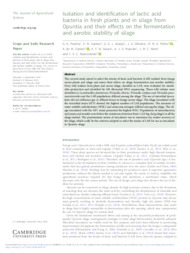Isolation and identification of lactic acid bacteria in fresh plants and in silage from Opuntia and their effects on the fermentation and aerobic stability of silage.
Isolation and identification of lactic acid bacteria in fresh plants and in silage from Opuntia and their effects on the fermentation and aerobic stability of silage.
Author(s): PEREIRA, G. A.; SANTOS, E. M.; ARAUJO, G. G. L. de; OLIVEIRA, J. S.; PINHO, R. M. A; ZANINE, A. de M.; SOUZA, A. F. N.; MACEDO, A. J. S.; NETO, J. M. C.; NASCIMENTO, T. V. C.
Summary: The current study aimed to select the strains of lactic acid bacteria (LAB) isolated from forage cactus plants and silage and assess their effects on silage fermentation and aerobic stability. Forty wild isolates from plant and cactus silage, classified as LAB, were evaluated for metabolite production and identified by 16S ribosomal DNA sequencing. These wild isolates were identified as Lactobacillus plantarum, Weissella cibaria, Weissella confusa and Weissella paramesenteroides and the LAB populations differed among the silage. The use of microbial inoculants did not influence gas or effluent losses in forage cactus silage. The silage inoculated with the microbial strain GP15 showed the highest number of LAB populations. The amounts of water-soluble carbohydrates (WSC) and ammonia nitrogen differed among the silage. The silage inoculated with the GP1 strain presented the highest WSC. Populations of enterobacteria and yeasts and moulds were below the minimum detection limit (<2.0 log cfu/g silage) in all the silage studied. The predominant action of inoculants was to maximize dry matter recovery of the silage, which could be the criterion adopted to select the strains of LAB for use as inoculants in Opuntia silage.
Publication year: 2020
Types of publication: Journal article
Unit: Embrapa Semi-arid Region
Observation
Some of Embrapa's publications are published as ePub files. To read them, use or download one of the following free software options to your computer or mobile device. Android: Google Play Books; IOS: iBooks; Windows and Linux: Calibre.
Access other publications
Access the Agricultural Research Database (BDPA) to consult Embrapa's full library collection and records.
Visit Embrapa Bookstore to purchase books and other publications sold by Embrapa.

